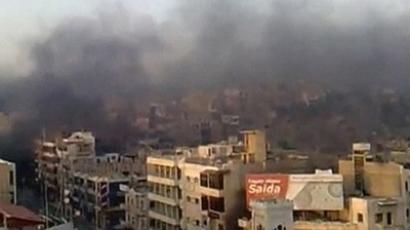“World cannot stop Syria from going through these convulsions”
As Syria intensifies the crackdown on the uprising, it is met with worldwide condemnation, and the EU imposes more sanctions on Damascus. But intervention and economic sanctions are not likely to do Syria any good, says Professor Joshua Landis.
More than 100 people were reportedly killed on Sunday when government tanks forced their way into the opposition stronghold of Hama.The Syrian government is clearly trying to take control of Hama as it does not want it to become a cradle of a new free military or a new political order, says Professor Joshua Landis from the Center for Middle East Studies at the University of Oklahoma.NATO has said it is not considering a military operation in Syria. Furthermore, all Syrian opposition leaders have insisted that there is no foreign intervention. According to Professor Landis, the sanctions against Syrian officials by the US and the EU have been imposed for “domestic reasons” so that they feel that they are doing something.He explains that the sanctions that were imposed in Iraq, Iran or Libya have not worked. “When they have worked, they’ve starved the people, not the government.” “That’s the danger of sanctions – you feel good because you feel like you are doing something and you can tell the opposition that you are on their side,” he says.Professor Landis stresses that military intervention and economic sanctions will not do Syria any good.“In fact you often hurt people you don’t want to hurt.”The ongoing unrest in Syria could result in more disruption in the Middle East, believes Landis. “Saudi Arabia feels threatened by the whole Arab Spring… It could help destabilize Iraq or Lebanon. Turkey doesn’t like it, because there have been refugees.” He highlights that these are the challenges for Syria’s neighbors.“I am not sure the world can stop Syria from going through these convulsions,” he concludes.














